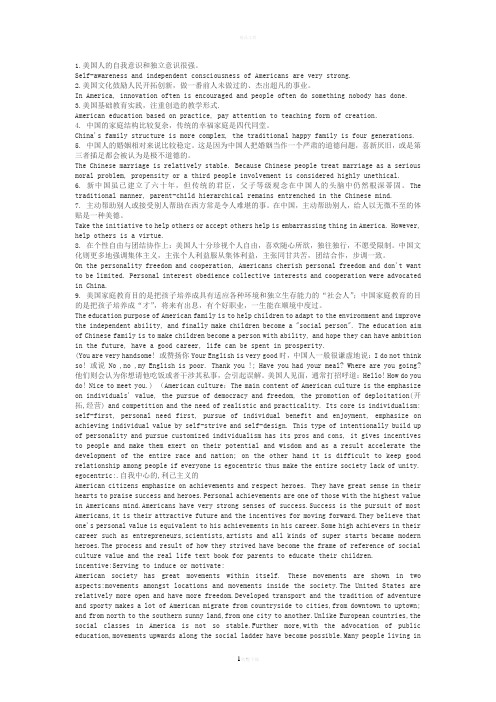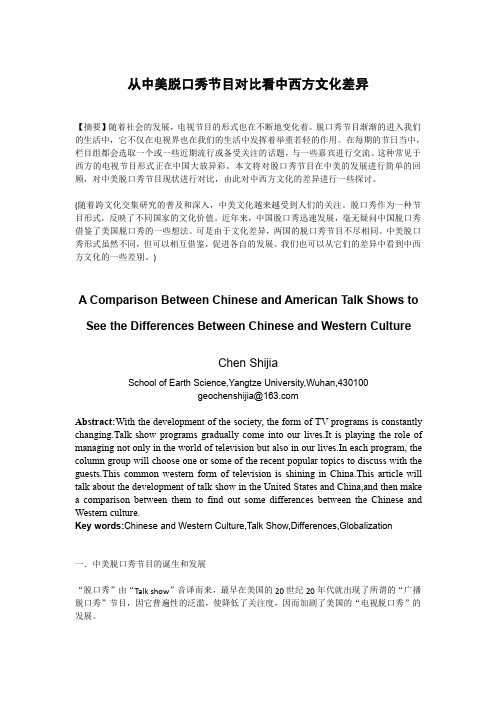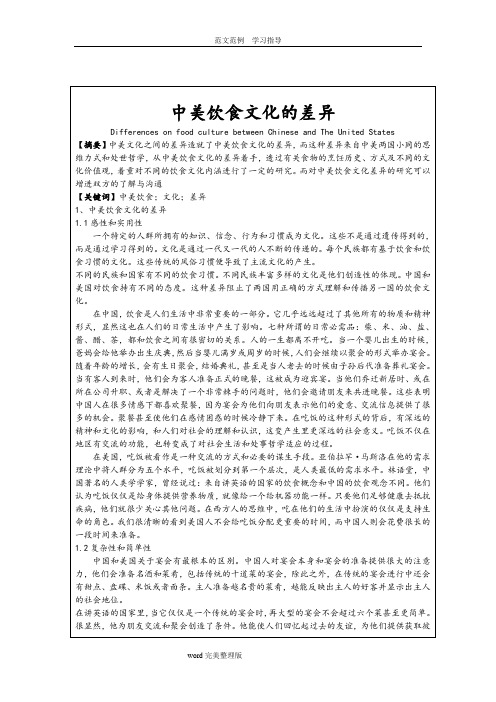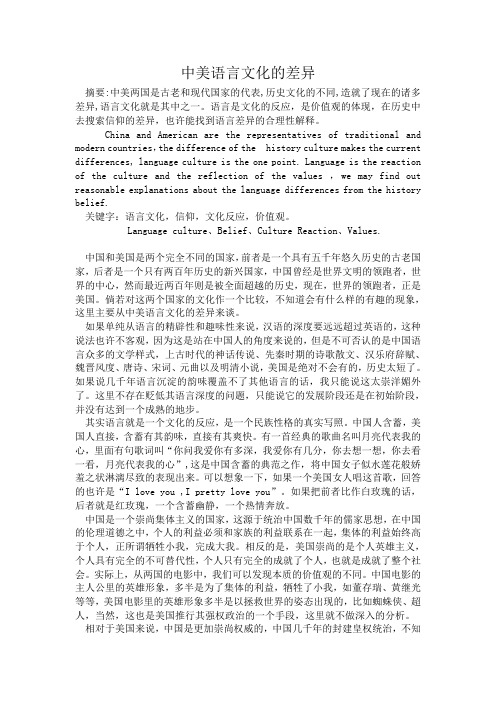中国文化和美国文化的差异(英文)
中美文化差异英文版

1.美国人的自我意识和独立意识很强。
Self-awareness and independent consciousness of Americans are very strong.2.美国文化鼓励人民开拓创新,做一番前人未做过的、杰出超凡的事业。
In America, innovation often is encouraged and people often do something nobody has done. 3.美国基础教育实践,注重创造的教学形式.American education based on practice, pay attention to teaching form of creation.4. 中国的家庭结构比较复杂,传统的幸福家庭是四代同堂。
China's family structure is more complex, the traditional happy family is four generations.5. 中国人的婚姻相对来说比较稳定。
这是因为中国人把婚姻当作一个严肃的道德问题,喜新厌旧,或是第三者插足都会被认为是极不道德的。
The Chinese marriage is relatively stable. Because Chinese people treat marriage as a serious moral problem, propensity or a third people involvement is considered highly unethical.6. 新中国虽已建立了六十年,但传统的君臣,父子等级观念在中国人的头脑中仍然根深蒂固。
The traditional manner, parent-child hierarchical remains entrenched in the Chinese mind.7. 主动帮助别人或接受别人帮助在西方常是令人难堪的事。
中国和美国之间的文化差异英语作文

中国和美国之间的文化差异英语作文全文共3篇示例,供读者参考篇1Cultural Differences Between China and the United StatesIntroductionChina and the United States are two of the world's biggest economic powers with rich cultural heritages. However, they have stark differences in their culture, traditions, customs, and behavior patterns. In this essay, we will explore the cultural differences between these two nations and how they impact various aspects of their societies.1. Individualism vs. CollectivismOne of the biggest cultural differences between China and the United States is the concept of individualism vs. collectivism. In the United States, individualism is highly valued, and people are encouraged to express their opinions, stand out from the crowd, and pursue their personal goals. On the other hand, China is a collectivist society where the needs of the group are prioritized over individual desires. People in China are expectedto adhere to social norms, maintain harmony within the community, and show respect to authority figures.2. Communication StylesChinese communication style is often indirect and implicit, with people using subtle gestures, facial expressions, and body language to convey their messages. In contrast, Americans tend to be more direct, explicit, and assertive in their communication. They value clarity, transparency, and openness in their interactions, and are more likely to express their thoughts and feelings without hesitation.3. Work EthicAnother significant difference between China and the United States is their work ethic. Chinese people are known for their strong work ethic, dedication, and perseverance. They often work long hours, prioritize career advancement, and are willing to make personal sacrifices for the success of their organization. On the other hand, Americans value work-life balance, prioritize leisure time, and are more likely to switch jobs for better opportunities or personal fulfillment.4. Family ValuesIn China, family is the cornerstone of society, and filial piety is deeply ingrained in the culture. Children are expected to obey their parents, take care of them in old age, and uphold family honor and traditions. In contrast, American families tend to be more nuclear and individualistic, with parents encouraging their children to be independent, pursue their dreams, and make their own choices in life.5. Food and Dining EtiquetteChinese cuisine is famous for its diversity, flavors, and regional specialties. Dining in China is a communal and social activity where people share dishes, use chopsticks, and show respect to the host and elders at the table. In contrast, American cuisine is more casual, with a focus on convenience, fast food, and large portion sizes. Dining in the United States is often informal, with people using forks, knives, and their hands to eat, and paying separately for their meals.ConclusionIn conclusion, the cultural differences between China and the United States are vast and profound, impacting various aspects of their societies. While both nations have their unique strengths and values, it is essential to understand and appreciate these differences to foster mutual understanding, respect, andcooperation between them. By embracing cultural diversity and learning from each other, China and the United States can build stronger relationships and create a more harmonious world for future generations.篇2Cultural Differences Between China and the United StatesChina and the United States are two major global powers that have significant cultural differences. These differences can be seen in various aspects of life such as communication style, social interactions, work ethic, and values. Understanding these differences is crucial for people from both countries to bridge the gap and build strong relationships.One of the most noticeable cultural differences between China and the United States is their communication style. In China, communication tends to be more indirect, and people often use nonverbal cues to convey their messages. On the other hand, Americans tend to be more direct and explicit in their communication, preferring clear and straightforward language. This difference can lead to misunderstandings and conflicts if not acknowledged and addressed.Social interactions also differ between the two countries. In China, relationships are based on hierarchy and respect for authority. People tend to value group harmony over individual autonomy and will often sacrifice their own needs for the greater good. In contrast, Americans value individuality and independence, placing a high importance on personal freedom and self-expression. This difference can lead to cultural clashes, especially in collaborative work environments or social settings.Work ethic is another area where China and the United States have distinct cultural differences. In China, there is a strong emphasis on hard work, discipline, and dedication to one's job. People are expected to put in long hours and show loyalty to their employers. On the other hand, Americans value work-life balance and prioritize personal time and leisure activities. This difference can lead to misunderstandings in the workplace, with Chinese employees viewing American counterparts as lazy or uncommitted, while Americans might see Chinese colleagues as workaholics.Values also play a significant role in shaping cultural differences between China and the United States. Chinese culture places a high value on tradition, family, and community harmony. People are expected to adhere to social norms andmaintain strong relationships with their family and community. In contrast, American culture values individualism, innovation, and diversity. People are encouraged to think independently, challenge norms, and pursue their own goals and ambitions. This contrast in values can create tensions in cross-cultural interactions, as each side may have different expectations and priorities.Despite these cultural differences, both China and the United States have much to offer each other in terms of collaboration, innovation, and mutual understanding. By acknowledging and respecting each other's cultural differences, people from both countries can build strong relationships and find common ground. Cultural exchange programs, intercultural training, and cross-cultural communication skills can help bridge the gap and foster positive interactions between Chinese and American individuals and businesses.In conclusion, the cultural differences between China and the United States are significant and can present challenges in cross-cultural interactions. By understanding and respecting each other's communication style, social interactions, work ethic, and values, people from both countries can build strong relationships and foster mutual understanding. Embracingdiversity and promoting cultural awareness are key steps towards bridging the gap and building a more connected and inclusive global community.篇3Cultural Differences Between China and the United StatesCultural differences between China and the United States are vast and deeply rooted in history, values, beliefs, and societal norms. These differences shape the way people from each country think, behave, and interact with one another. Understanding these differences can help individuals navigate cross-cultural interactions more effectively and respectfully.One of the most noticeable differences between Chinese and American culture is the concept of collectivism versus individualism. China is a collectivist society, valuing harmony within the group and prioritizing the needs of the community over individual desires. In contrast, the United States is an individualist society, placing emphasis on personal freedom, independence, and self-expression.This difference in cultural values can be seen in various aspects of daily life. For example, Chinese people tend to make decisions based on what is best for the group, while Americansare more likely to consider their own needs and desires. In business settings, Chinese employees may be more inclined to seek consensus and avoid conflict, while American workers may be more assertive and competitive.Another key cultural difference between China and the United States is the concept of face. In Chinese culture, face, or mianzi, refers to one's reputation, social status, and dignity. Saving face, or maintaining one's honor and pride, is of utmost importance in Chinese society. In contrast, Americans value direct communication, honesty, and transparency, even if it means risking embarrassment or confrontation.This difference in the importance of face can lead to misunderstandings and miscommunication in cross-cultural interactions. Chinese individuals may be more indirect in their communication and decision-making to avoid causing offense or losing face, while Americans may perceive this indirectness as dishonesty or insincerity.Additionally, the role of hierarchy and authority differs between Chinese and American culture. In China, respect for authority figures, such as elders and leaders, is deeply ingrained in society. Showing deference and obedience to those in positions of power is expected and valued. In the United States,however, there is a greater emphasis on equality, individual rights, and challenging authority when necessary.These cultural differences can impact various aspects of communication, decision-making, and collaboration incross-cultural settings. Understanding and respecting these differences can foster more effective and harmonious relationships between individuals from China and the United States.In conclusion, the cultural differences between China and the United States are vast and complex, encompassing values, beliefs, social norms, and communication styles. By recognizing and respecting these differences, individuals from both countries can navigate cross-cultural interactions with greater empathy, understanding, and mutual respect. Embracing diversity and cultural differences can lead to more enriching and meaningful relationships between people from different backgrounds.。
从中美脱口秀对比看中西方文化差异A Comparison Between Chinese and American Talk Shows

从中美脱口秀节目对比看中西方文化差异【摘要】随着社会的发展,电视节目的形式也在不断地变化着。
脱口秀节目渐渐的进入我们的生活中,它不仅在电视界也在我们的生活中发挥着举重若轻的作用。
在每期的节日当中,栏目组都会选取一个或一些近期流行或备受关注的话题,与一些嘉宾进行交流。
这种常见于西方的电视节目形式正在中国大放异彩。
本文将对脱口秀节目在中美的发展进行简单的回顾,对中美脱口秀节目现状进行对比,由此对中西方文化的差异进行一些探讨。
(随着跨文化交集研究的普及和深入,中美文化越来越受到人们的关注。
脱口秀作为一种节目形式,反映了不同国家的文化价值。
近年来,中国脱口秀迅速发展,毫无疑问中国脱口秀借鉴了美国脱口秀的一些想法。
可是由于文化差异,两国的脱口秀节目不尽相同。
中美脱口秀形式虽然不同,但可以相互借鉴,促进各自的发展。
我们也可以从它们的差异中看到中西方文化的一些差别。
)A Comparison Between Chinese and American Talk Shows to See the Differences Between Chinese and Western CultureChen ShijiaSchool of Earth Science,Yangtze University,Wuhan,430100geochenshijia@Abstract:With the development of the society,the form of TV programs is constantly changing.Talk show programs gradually come into our lives.It is playing the role of managing not only in the world of television but also in our lives.In each program,the column group will choose one or some of the recent popular topics to discuss with the guests.This common western form of television is shining in China.This article will talk about the development of talk show in the United States and China,and then make a comparison between them to find out some differences between the Chinese and Western culture.Key words:Chinese and Western Culture,Talk Show,Differences,Globalization一.中美脱口秀节目的诞生和发展“脱口秀”由“Talk show”音译而来,最早在美国的20世纪20年代就出现了所谓的“广播脱口秀”节目,因它普遍性的泛滥,使降低了关注度,因而加剧了美国的“电视脱口秀”的发展。
中美饮食文化差异英文版加翻译

最大的区别也在于饮食的营养上。从古代到现代,中国的饮食文化已经发展了许多的分支,例如苏、湘、闽、粤、浙、回。盘碟优美显示在不同的分支里。这种饮食意识已经无意识的渗透到了整个饮食活动当中,选择材料、烹调、搭配、餐具的使用、甚至是饮食环境选择的过程,都强调盘子的优雅。与中国相比,讲英语国家的食物是很简单的,缺乏一种漂亮的气氛,而且,他们的烹饪技术和中国的相比是低等的,许多美国事物的分支是从其他国家引进的,但是从食物的营养价值来判断,讲英语的国家的食物讲究营养,并且试图让食物低盐同时维持各种营养的平衡。美国人认为吃饭是维持身体健康的一种方式。不管他们吃什么,不管他们吃得食物多简单,他们关注的仅仅是营养,有时甚至忽视他们的口感。
在美国,吃饭被看作是一种交流的方式和必要的谋生手段。亚伯拉罕·马斯洛在他的需求理论中将人群分为五个水平,吃饭被划分到第一个层次,是人类最低的需求水平。林语堂,中国著名的人类学学家,曾经说过:来自讲英语的国家的饮食概念和中国的饮食观念不同。他们认为吃饭仅仅是给身体提供营养物质,就像给一个给机器功能一样。只要他们足够健康去抵抗疾病,他们就很少关心其他问题。在西方人的思维中,吃在他们的生活中扮演的仅仅是支持生命的角色。我们很清晰的看到美国人不会给吃饭分配更重要的时间,而中国人则会花费很长的一段时间来准备。
1.5座位准备的区别
座位的准备是展现人们社会地位和朋友关系的一种重要的方式。在不同的国家,座位的布局是不同的。哈勒曾经说过“空间讲话”来描述空间的角色。在中国,被认为是最尊贵的客人应该坐到桌子的南面,普通的朋友坐到桌子北面的部分。当在古代的时候,来自讲英语的国家的人认为挨着主人的座位被认为是最尊贵的。另一个区别就是妇女的社会地位。在古代,中国的女人是没有社会地位的,是男人的附庸。尽管中国女人的社会地位已经提高了并且能够和男人坐到一起用餐。仍然有这样一种现象,女人坐到一张桌子,男人坐到另一张桌子。在中国有一句礼貌口号“女士优先”。在讲英语的国家里女人占有很重要的社会地位。男人和女人同桌就餐,并且他们经常坐到一起,这表明男女是平等的。
中美语言文化的差异

中美语言文化的差异摘要:中美两国是古老和现代国家的代表,历史文化的不同,造就了现在的诸多差异,语言文化就是其中之一。
语言是文化的反应,是价值观的体现,在历史中去搜索信仰的差异,也许能找到语言差异的合理性解释。
China and American are the representatives of traditional and modern countries,the difference of the history culture makes the current differences, language culture is the one point. Language is the reactionof the culture and the reflection of the values ,we may find out reasonable explanations about the language differences from the history belief.关键字:语言文化,信仰,文化反应,价值观。
Language culture、Belief、Culture Reaction、Values.中国和美国是两个完全不同的国家,前者是一个具有五千年悠久历史的古老国家,后者是一个只有两百年历史的新兴国家,中国曾经是世界文明的领跑者,世界的中心,然而最近两百年则是被全面超越的历史,现在,世界的领跑者,正是美国。
倘若对这两个国家的文化作一个比较,不知道会有什么样的有趣的现象,这里主要从中美语言文化的差异来谈。
如果单纯从语言的精辟性和趣味性来说,汉语的深度要远远超过英语的,这种说法也许不客观,因为这是站在中国人的角度来说的,但是不可否认的是中国语言众多的文学样式,上古时代的神话传说、先秦时期的诗歌散文、汉乐府辞赋、魏晋风度、唐诗、宋词、元曲以及明清小说,美国是绝对不会有的,历史太短了。
中美文化差异英文版

1.美国人的自我意识和独立意识很强。
Self-awareness and independent consciousness of Americans are very strong.2.美国文化鼓励人民开拓创新,做一番前人未做过的、杰出超凡的事业。
In America, innovation often is encouraged and people often do something nobody has done.3.美国基础教育实践,注重创造的教学形式.American education based on practice, pay attention to teaching form of creation.4. 中国的家庭结构比较复杂,传统的幸福家庭是四代同堂。
China's family structure is more complex, the traditional happy family is four generations.5. 中国人的婚姻相对来说比较稳定。
这是因为中国人把婚姻当作一个严肃的道德问题,喜新厌旧,或是第三者插足都会被认为是极不道德的。
The Chinese marriage is relatively stable. Because Chinese people treat marriage as a serious moral problem, propensity or a third people involvement is considered highly unethical.6. 新中国虽已建立了六十年,但传统的君臣,父子等级观念在中国人的头脑中仍然根深蒂固。
The traditional manner, parent-child hierarchical remains entrenched in the Chinese mind.7. 主动帮助别人或接受别人帮助在西方常是令人难堪的事。
中国文化与美国文化的差异 (3)
Overcoming the cultural issues associated with plagiarism for International studentsCharles Juwah, David Lal, and Ahmed BeloucifEvidence available in the literature lists a diverse range of reasons why students plagiarise. Some of the reasons include: lack of adequate study skills, poor academic writing and referencing skills, poor time management, being under pressure as a result too much assessment workload; sheer laziness, etc. …Some research findings have identified cultural factors as a reason why some international students plagiarise …A majority of international students are non-native speakers and have English as a second orthird language and therefore, do have problems communicating in English… In addition,previous educational backgrounds a nd lack of understanding of the norms of the ‘western construct’ of plagiarism constitute major cultural and competence-based factors why some international students plagiarise …In Confucian cultures (China, Japan, Korea, etc) the individual ownership of spoken or writtenword or ideas is not the norm as is the case in western countries. In those cultures, learningwhich involves analysis or original thought and deviation from the original text is not highly valued, and the individual may be referred to as being egoistic and non-conformist.Individualism (egoism) is considered as impolite and arrogance. And innovation amongst theyoung is seen as deviation from the societal norms and disrespect for traditional values…. Withthis form of cultural teaching in which originality and innovation are ‘frowned’ at, studentsfrom those cultures believe that quoting verbatim (word for word) is honouring or showingrespect to the author.In African, Arabian, and Confucian cultures, traditional learning is done largely through memorisation and folklore (story telling). Therefore, memorisation of text helps deepen and to consolidate learning. In those cultures, perfect or near perfect recital and/or reproduction of learned text and verbatim quoting is often highly prized and rewarded. Also, quoting theteacher verbatim is seen as a mark of respect…. The disadvantage of rote learning or memorisation is evidenced by the lack of critical analysis, synthesis, problem framing, questioning, evaluating and analytical reflection, commonly identified in the work of some international students. …In some Asian cultures, knowledge in the public domain, for example, the Internet is regardedas ‘common’ knowledge and is freely available for use. So, it is normal to ‘cut and paste’ fromthe Internet without proper appropriation or acknowledgement of source. This view is diametrically opposed to the western construct概念 of plagiarism.…For many years now in China, plagiarism among professors and cheating among studentshave been acceptable practices… Peking University’s move in 2002 to address the issue of plagiarism was the first time that a Chinese university has adopted a written rule onplagiarism. Equally in India, freely copying from the Internet is common practice.Furthermore, in Asian cultures, group collaboration is a key principle that underpins social interactions and customs. These group interactions are fundamental in ensuring socialcohesion and connection to the community. Students from those cultures extend such customof group cooperation to their academic studies (i.e. sharing of information and written workwith each other), a practice that inadvertently leads to academic malpractice….I read through all the threads in Discussion section, and I believe every one hadmade a clear point that culture differences accounts the main reason that for most international students fail to form a proper writing style. Particularly, I agree withJing's idea that the research paper Overcoming the cultural issues associatedwith plagiarism for International students may exaggerate the situation in China, especially with the statement as below:- In some Asian cultures, knowledge in the public domain, for example, the Internet is regarded as ‘common’ knowledge and is freely available for use. So, it is normal to ‘cut and paste’ from the Internet without proper appropriation or acknowledgement of source. This view is diametrically opposed to the western construct of plagiarism. Above all, the paper was out of date. It cited some resource in 2002, which was more than a decade ago. Information technology has changed drastically in the latest decade, compare to 2002, we have more databases, fasterdata acquisition and processing softwares, and many user-friendly plagiarism checker programs, they made plagiarizing very hard to carry out.Secondly, I believe the statement can not reflect the truth in Chinese academic perspective toward the usage of internet. I still remember when I started to conduct my research paper in my first year, the very first instruction my professor gave to me is: do not use data from Wikipedia for your academic research, Wikipedia is not an accountable resource because everyone can edit on it. Thus, the saying that the Internet is regarded as ‘common’ kno wledge is not true.Thirdly, the Chinese people value more and more on honesty, the cost of cheating in academic field is considerable. For example, at least two Deans from a very famous Chinese universities had to resign from his job because of academic cheating; former Microsoft China President Tangjun was accused of fabricating credentials, ledhis resignation of CEO in a famous IT company. These cases demonstrated that China, as world's second largest power, is putting more and more efforts on building a credit society.To sum up, it is very helpful for us to stay conscious when dealing with academic writing, and I agree most of the points that the paper presents, the idea that the learning method of memorization leads to rote learning rather than critical thinking is quite inspiring. However, I believe the situation of plagiarism in China has been changed after the publishing of this paper, and I hope all the professors in theUS would discard stereotypes against Chinese students.。
中国与美国的文化差异
四、独立性- independence
• 美国人通常较不喜欢依靠别人,甚至父母的帮忙也不一定乐于接受, 而父母亦鼓励子女早早离家,独立地生活与发展。我国青少年在这方 面就发展得较慢。对留学生来说,要注意到指导教授非常重视研究生 能够独立做研究的能力。而对英文不灵光的留学生来说,当你向美国 人借笔记时如被拒绝,不一定表示他们讨厌你,极有可能是他们将心 比心,认为你应该独立而已。 • Americans usually less like depend on others, or even parents help also is not willing to accept, and parents also encourage children left home early in life and development, independently. Our country teenagers in this respect development more slowly. For international students, must pay attention to the supervising professor attaches great importance to the graduate student independently and do research ability. And for avira antivir of international students, when you ask the American people borrow your notes as was refused, does not necessarily mean that they hate you, is most likely they care, think you should independent just.
中国美国饮食文化差异的英语作文
中国美国饮食文化差异的英语作文我们用英语作文,如何把我们对于中国的饮食文化与美国的差别表达出来?下面是小编给大家整理的中美饮食文化差异的英语写作范文,供大家参阅!中国美国饮食文化差异的英语作文篇1 food is the heaven to the human. Since human beings appeared on the earth millions years ago, we have had food everyday to satisfy the need of energy. Because of the influence of religion, climate, and region, different countries have different dietary cultures.China, which has a history longer than five thousand years, is one of the biggest countries in the world, and the United States is the super country that has a great influence to the whole world. We study these differences and then find out the points that can be digested, in order to facilitate the communication about cultures between China and the United States. By the analysis of the differences between Chinese and American dietary cultures, we can comprehend the respective cultural traditions of China and the west and we can also improve and create the new culture of China. In my paper, I would like to discuss the difference of food between the two countries.中国美国饮食文化差异的英语作文篇2 Hello , everyone we are very proud to introduce our topic . my name is huangxiaolong ,he is jiangzhihui ,he is lihuan .lets begin. Our topic is Differences Between Chinese And Western Food. cultural differences between East and West created a difference in food culture。
美国和中国的食物文化差异英语作文
美国和中国的食物文化差异英语作文English: One major difference between the food cultures of the United States and China lies in the types of ingredients and flavors commonly used. In the United States, there is a heavy reliance on processed and fast foods, resulting in dishes that are often high in saturated fats, sugars, and sodium. On the other hand, Chinese cuisine emphasizes fresh ingredients such as vegetables, seafood,and lean meats, leading to a healthier overall diet. Additionally, Chinese cooking typically involves a wider array of spices and seasonings, creating complex and flavorful dishes that are less reliant on added fats or sugars for taste. Another key difference is the communal aspect of Chinese dining, where meals are often shared among multiple people, promoting a sense of unity and togetherness. In contrast, American dining tends to focus more on individual portions and personal choice, reflecting a more individualistic culture overall.Translated content: 美国和中国饮食文化的一个主要区别在于常用的食材和口味类型。
- 1、下载文档前请自行甄别文档内容的完整性,平台不提供额外的编辑、内容补充、找答案等附加服务。
- 2、"仅部分预览"的文档,不可在线预览部分如存在完整性等问题,可反馈申请退款(可完整预览的文档不适用该条件!)。
- 3、如文档侵犯您的权益,请联系客服反馈,我们会尽快为您处理(人工客服工作时间:9:00-18:30)。
2021/3/10
讲解:XX
THANKS
Eryone
11
2021/3/10
讲解:XX
ቤተ መጻሕፍቲ ባይዱ
THANKS
Everyone
Designed by Wangguan
12
感谢您的阅读收藏,谢谢!
2021/3/10
13
2021/3/10
讲解:XX
6
2021/3/10
Soccer
Basketball
Outdoor sports
讲解:XX
Western sports
7
2021/3/10
THANKS
Everyone
讲解:XX
8
2021/3/10
Tai Ji
Ping-pong
Badminton
讲解:XX
Chinese sports
• But Chinese always think that sports represent excessive attention to plaything saps the will. Except wasting time of study, there is no good advantage for children. Many teachers also seize gymnatisc time of student to remediation.
2021/3/10
讲解:XX
3
02
2021/3/10
• In Lili' s opinion, she deems that sport students are poor students. Her daughter must study hard, which shouldn't care anything apart from study.
9
2021/3/10
THANKS
Everyone
讲解:XX
10
• Chinese purse meanthingful thigsn,especially • internality. • Western people purse the beauty of externality, • and they attach important to the value of sports
THE DIFFERENCES OF CHINESE AND WESTERN CULTURE IN SPORTS.
2021/3/10
讲解:XX
1
01
Mummy's attitude about sporting
2021/3/10
讲解:XX
2
01
Mary and lili is college of foreign enterprise,they all have a child who is studying at elementary school.When they talk about the topic of ' whether let the children take part in physical activities',they always have conflict to it.
• On the contrary, Mary thinks that she will support her son to join various sports. Even if sport time covered study's.
讲解:XX
4
•
To summary.
• In western people's opinion,sports especially the item of unite cooperation,which is a indispensable part of life.It represents somebody's ability of lead and cooperation.However,when foreign students choose a college which attach importance to gymnastic score.
• We still learn a lot from merit of western education.
• Don't kill children's hobby.
2021/3/10
讲解:XX
5
02 THE DIFFERENCES OF CHINESE AND WESTERN CULTURE TO AFFECT ITEM OF GYM
